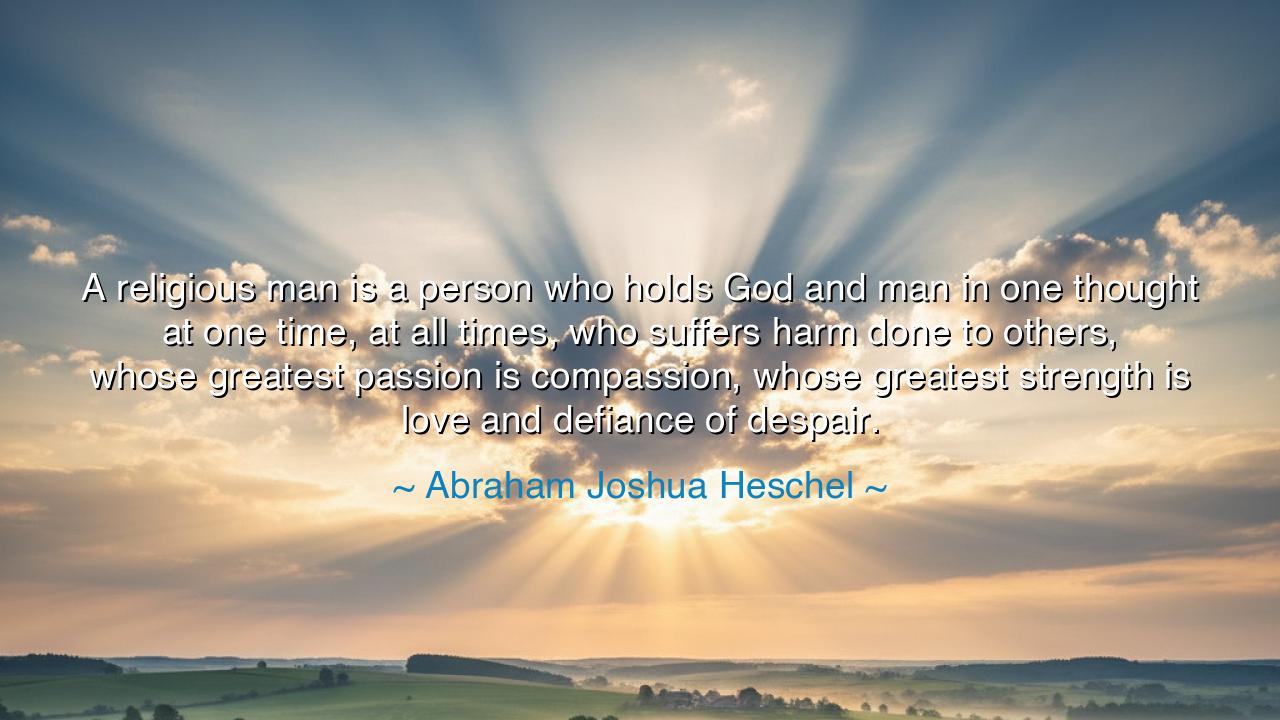
A religious man is a person who holds God and man in one thought
A religious man is a person who holds God and man in one thought at one time, at all times, who suffers harm done to others, whose greatest passion is compassion, whose greatest strength is love and defiance of despair.






“A religious man is a person who holds God and man in one thought at one time, at all times, who suffers harm done to others, whose greatest passion is compassion, whose greatest strength is love and defiance of despair.” Thus spoke Abraham Joshua Heschel, the great Jewish mystic, philosopher, and prophet of the modern age. His words are a hymn of both faith and humanity, a bridge between heaven and earth. In this single sentence, Heschel offers not a definition of religion, but a vision — one that calls the soul to its highest form of being. To be religious, he teaches, is not to dwell in ritual alone, nor to separate the sacred from the world, but to hold God and man together, inseparably, in the same breath, the same heartbeat, the same act of love.
Heschel was a man who walked through the fires of history. Born in Poland, raised in the traditions of Hasidic devotion, he later fled the darkness of Nazi Europe, where faith was mocked and humanity desecrated. He saw religion corrupted by fear and indifference, and yet he did not abandon it — he reclaimed it. For him, the true religious life was not one of withdrawal from the suffering of the world, but of engagement with it. To love God, he said, is to feel the pain of His children; to pray is to open one’s heart until it breaks for the wounds of humanity. His words come not from comfort, but from compassion forged in suffering — the faith of one who refused despair.
To hold God and man in one thought is to understand that divinity is not a distant force, but a presence dwelling in the human heart. It is to see that to honor God is to honor His image in others. When Heschel says “at one time, at all times,” he calls for a permanent awareness, a life lived in sacred attention — where every act, no matter how small, is touched by the consciousness of love. The truly religious soul does not turn to God only in prayer and forget Him in action; nor does it serve man while forgetting the divine. It is the fusion of both — faith translated into mercy, and mercy illuminated by faith — that gives life its meaning.
Heschel’s vision was not abstract. He lived it with courage and fire. In the 1960s, when the shadow of racial injustice fell over America, Heschel marched beside Martin Luther King Jr. in Selma, his white beard flowing like the prophets of old. He said afterward, “I felt my legs were praying.” That moment embodied his definition of the religious life — where prayer becomes action, and action becomes prayer. He did not merely speak of compassion; he walked it. He did not only preach against despair; he defied it. His life showed that the highest form of worship is not isolation from the world, but solidarity with its suffering.
In saying that a religious person “suffers harm done to others,” Heschel reveals the true heart of holiness. Religion, he teaches, is not self-centered peace, but shared pain. The truly spiritual person does not ask, “What is happening to me?” but, “What is happening to my brother, my sister, my neighbor?” This is the essence of compassion — not pity from above, but participation from within. To suffer with others is to unite oneself to both the human and the divine. For God Himself, in every faith tradition, is described as the one who hears the cries of the oppressed, who grieves with the grieving. Thus, when a human heart feels the sorrow of another, it becomes, for a moment, Godlike.
And then Heschel speaks of the greatest strength — love and defiance of despair. These two are the twin wings of the soul that would soar beyond destruction. Love, he says, is not weakness, but divine rebellion. To love in a broken world is to defy the forces that would strip meaning from life. Despair whispers, “There is no hope,” but love replies, “There is still God, still goodness, still light.” This defiance is not born of naivety but of faith — the faith that even in darkness, the spark of the eternal still burns. To live this way is to become a vessel of courage, a guardian of hope in a world that too easily forgets it.
So, O seekers of truth, take Heschel’s wisdom as a sacred command: hold God and man in one thought. Do not divide what is holy from what is human. Let your love for the divine make you tender toward the suffering of others, and let your compassion for others draw you nearer to God. When you see injustice, do not turn away; when you see despair, let your heart answer with hope. Be strong, not in indifference, but in love; be fearless, not in cruelty, but in compassion.
For in the end, as Abraham Joshua Heschel teaches, the truest religion is not found in temples of stone, but in hearts that love and refuse despair. The religious man is not the one who escapes the world to find God, but the one who brings God into the world through mercy. Such a person does not seek heaven by leaving earth, but by sanctifying it with every act of kindness. Therefore, live so that when others see you, they sense both God’s presence and humanity’s goodness intertwined — for then, and only then, will the divine and the human dwell as one.






AAdministratorAdministrator
Welcome, honored guests. Please leave a comment, we will respond soon